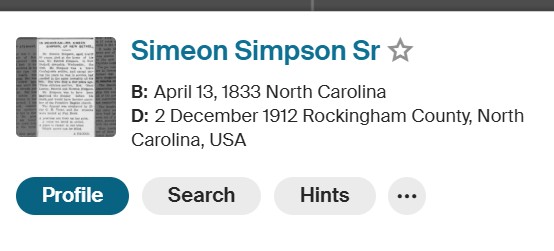In earlier blogs, I shared the fairly typical challenge of separating ancestors with the same names. That is, in the case that I provided, the ancestors shared the same/similar names, birthdates and birth locations. See below:


Frame the research question
Similar to planning an event, the first step in achieving desired, accurate results in ancestry and genealogy research, is to know thy primary question that requires the ultimate answer. In this case, my primary questions are:
- Are there two distinct individuals named Simeon Simpson born ~1833 in North Carolina—one enslaver’s son (white) and one enslaved/freed?
- If so, — and if so, how are they distinguished and are they biologically related?
Working hypotheses:
-
-
Two different men, same name/year, same county.
-
Same county, hidden kinship — is the one son the product of the enslaver or enslaver’s male relative? Who is the biological father?
-
Different counties/communities—name coincidence only.
-
Create a research log (spreadsheet) with columns: Record, Repository/URL, Jurisdiction, Date of Record, Reported Age, Implied Birth Yr, Race/Status, Household/Associates, Notes, Citation.
Summary of my review and verification
First, I completed another name and variant searches for Simeon/Simon/Sion/Simons + Simpson/Simson/Sampson/Sambson. Why?
The early Census takers were U.S. Marshals and their contractors. They, along with ministers and clerks, wrote what they heard and not what was correct. There are also regional accents that caused names to be spoken that usually sounded differently in other areas.
Also, the post-Civil War/Reconstruction period showed many deliberate name changes. The same is true during and after the Great Migration.
-
Phonetic spelling: Census takers, ministers, or clerks wrote what they heard, not what was “correct.”
-
Low literacy: Many ancestors could not spell their own names consistently, so others wrote it down for them.
-
Regional accents: A name spoken in one county or state might sound different elsewhere.
-
Deliberate changes: Some families altered spellings after migration or emancipation.The
-
Phonetic spelling: Census takers, ministers, or clerks wrote what they heard, not what was “correct.”
-
Low literacy: Many ancestors could not spell their own names consistently, so others wrote it down for them.
-
Regional accents: A name spoken in one county or state might sound different elsewhere.
-
Deliberate changes: Some families altered spellings after migration or emancipation.
-
Pull 1850 & 1860 population schedules for all white Simeon Simpson candidates; build Track A timeline.
-
Identify Simpson slaveholding households in 1850 & 1860 slave schedules; list enslaved males with ages 14 & 24 (±2) to match 1836/1842…1833 birth window.
-
Request probate/estate packets for those Simpson slaveholders; extract any enslaved “Simeon.”
-
Search Freedmen’s Bureau labor contracts in that county for Simeon attached to a Simpson employer.
-
Search Freedmen’s Bank for Simeon (Simpson) with NC birthplace; capture kin/former owner details.
-
Pull 1866 Cohabitation register for the county; look for Simeon and partner; note former owner.
-
Locate 1870 census entries for Black/Mulatto Simeon (Simpson/variants) in same county; map neighbors (FAN).
-
Check USCT and Confederate military files for men named Simeon/Simon Simpson b. ~1833 NC; note physical descriptions and next of kin.
-
Build the comparison table and update as you add records; highlight evidence of intersection or separation.

